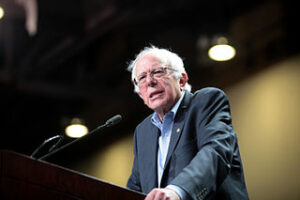
How Jimmy Carter demonstrated that non-violent prices foster economic equality. Retweet
Can a price be violent or nonviolent? Yes, it can. I’ll show you how below. I’ll also explain how non-violent prices foster economic equality. Let’s begin with…
The Bernie Problem
Left-statists like Bernie Sanders want to achieve economic equality using violence, through means both direct and indirect.
The direct means involve taking money from person A and giving it to person B. If person A resists then politicians, even Bernie, will send agents of The State to compel submission through threats or acts of violence.
The indirect means involve price fixing. The minimum wage is an example. It fixes the price for low-skilled labor. Employers must obey this dictate or suffer violent harm.
Left-statists believe their violence-based minimum wage will increase economic equality by forcing richer employers to give more of their wealth to poorer workers. But left-statists don’t understand that employers can resist such prices without actually violating the dictate. For instance…
An employer doesn’t have to resist by hiring “under the table” at a price below the dictated minimum. He or she can simply decline to hire anyone whose labor is worth less than the minimum wage. In fact, a business owner must do this or lose money. Please notice…
This outcome expands economic inequality
- The affluent employer retains money he would otherwise have spent on labor
- The poorly skilled worker has reduced opportunities to gain work experience and new skills
- The benefit of the minimum wage goes to some of the higher-paid workers the employer retains
- Fewer goods and services are produced, thereby raising the cost of living, which impacts the poorest the hardest
In other words…
The violence-based minimum wage increases economic disparities
What then is a non-violent price, and how do such prices foster economic equality? A non-violent price is any price to which a buyer and seller voluntarily agree. Such prices are not fixed by threats of “legal” violence. Rather, they freely float up and down based on supply and demand.
Non-violent prices have profound powers…
- A relatively low price makes it easier for consumers to buy the product or service. This spreads abundance to more people.
- A relatively high price sends two signals — first conserve me, then make more of me.
Conservation prevents shortages by limiting consumption. Meanwhile…
- Entrepreneurs notice the high price
- They respond by creating new production capacity.
- This expands the supply of the product and lowers the price.
- And the new lower price spreads abundance by making the product affordable for more people.
In other words…
The non-violent price expands economic equality.
Whereas once only the rich could afford things like…
- flying
- a computer
- a video recorder
…now everyone can afford these items! This didn’t happen because The State threatened violence to fix prices at some presumed fair level. It happened because the prices involved NO VIOLENCE! In fact…
When air travel prices were fixed by The State, only rich people could afford to fly. It was only after President Jimmy Carter liberated airline prices from statist violence that air travel became affordable for everyone. In fact, Carter removed the violence from a whole host of prices including…
- Oil pumped from domestic wells — this change ended the era of long gas lines and ushered in decades of cheap gasoline prices (when adjusted for inflation)
- Trucking and railroad prices — this made possible companies like Amazon and Ebay.
- Beer — this made today’s craft brewing revolution possible
Think about this. Really think about it…
Left-statists constantly tell us that we need violence-based regulations in order to protect the poor from exploitation by the rich, and to equalize economic outcomes. However…
In the only examples we have of major deregulation (all of which came from Jimmy Carter) the outcome was the exact opposite of what the left-statists constantly claim. And so…
If you want to foster economic equality, then embrace the Zero Aggression Principle. Don’t threaten or initiate violence against anyone, for any purpose, including for the supposed good intentions of economic equality. Specifically…
Don’t use violence to set prices. Favor non-violent prices. Go forth and argue thusly.

